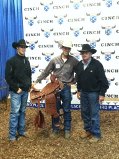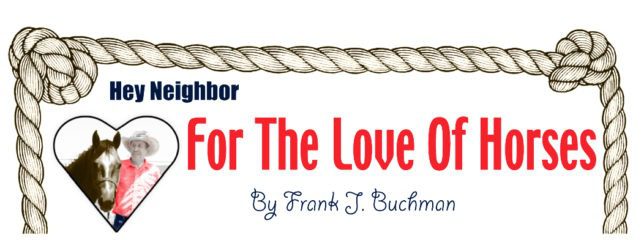How many college kids can make $28,300 for two days’ work?
Many are happy for the opportunity of “flippin’ a few burgers,” as the saying goes, just to have enough to skimp by.
And, Collin Domer might feel the financial hardships of being a university student sometimes, too.

But, it was not that way as Domer headed back to his college classes after collecting checks totaling more than many are paid for a year’s labor.
While it was the highest daily wages the Topeka native has received in his 21 years of life, there’s a lot more to the acquisition than bankrolling the cash.
“It all just came together,” evaluated Domer of collecting two major paychecks during the recent United States Team Roping Championships National Finals in Oklahoma City.
Certainly, a lot has to “come together” for such an accomplishment, considering there are so many variables involved.
Team roping is two cowboys on two horses roping and stretching a Corriente steer out as fast as possible. That’s a major accomplishment in itself when the logistics are honestly considered.
However, it’s much more complex than even that intricate five-part equation with so many unpredictable variables that can arise with two cowboys and three head of livestock.
“We had to qualify on four steers in the fastest time to place,” Domer explained.
So multiply the complicated puzzle and possibilities by four, or let’s take it times eight to be completely fair on how difficult the accomplishment really was.
Actually there were two checks picked up by Domer for his total.
The biggest individual take was $17,000 for his half of the winnings for placing third in the “Number 12 Shoot-Out.”
Domer was on the heading end of the run, again where he usually ropes. J.T. Schalla of Avondale, Colorado, served as his heeler in this particular competition.
“It definitely takes teamwork,” Domer emphasized. “Your horse, your partner, and his horse and the steers all have to work right together in order to win.”
Then just as important is the “consistency.” Not just one steer roped, but a total of four steers roped, and every one of them qualified on in “fast time.”
The Kansas-Colorado pair stretched four steers in a total of 32.44 seconds. That’s an average of just a bit more than eight seconds per run.
Another check totaling $22,600 was divided in two by Domer and his fellow Kansan and good friend Linden Stueve of Olpe after they roped and stretched four steers even faster, in 31.02 seconds. That was speedy enough to win first place in the “Number 10 Preliminary” division.
“I really appreciate my partners. I wouldn’t win anything if I didn’t have good partners who rope so well,” Domer again credited.
However, that other ever-so-important aspect of the success formula in any rodeo arena competition is the horse, and Domer emphasized how essential and special his horse was to the most recent winnings.
“I just got a new horse called Cactus from Jerry Linaweaver at Leavenworth, and I used him in both of those competitions,” Domer said. “He’s a great horse, and I’d have to give credit for him really doing his part.”
As appreciative as Domer is of his “new” 10-year-old red roan gelding, the “bay mare called MoJo that I’ve been roping on from Joe Calvaruzo is a great horse, too. I don’t want to take anything away from her.”
Without hesitation Domer brings up the importance as well of his “practice horse.”
The champion said, “I keep two horses at college with me, one to practice on, and my competition horse. My practice horse is the old buckskin Zans Rawhide gelding I got from my grandpa (Dr. Bob Domer. I’ve ridden him for years, including high school rodeos and before that.
“Otis is really a dependable horse to have even as backup for competition,” Domer credited.
As essential as all of these criteria as for his roping success, Domer is emphatic in crediting his family for their support.
The oldest son of Jay Domer, a longtime champion rodeo competitor in his own right, Collin said, “I literally grew up with a rope in my hand and have been riding horses ever since I can remember.
“My Dad has helped me from the very beginning, and he continues to be a big part of my roping. We rope together in practice and in competition,” Domer recognized. “Dad is a great horseman, and has been instrumental in acquiring, training, tuning, and critiquing my rope horses.”
On a rodeo scholarship participating as a member of the Northwestern Oklahoma State University Rodeo Team at Alva, Domer pointed out, “I don’t go home very often, but I see my folks just about every weekend. They come to all of the rodeos I’m in.”
However, his parents weren’t in attendance at the roping where he collected the big checks. “We talked all week, and they watched live feed on the internet,” Domer said.
Although they were not a team for the wins in Oklahoma City this time, Domer’s frequent partner is his younger brother, Ryan, who’s a scholarship member of the Northeastern Oklahoma State University Rodeo Team at Miami.
“We’ve had a lot of good runs together over the years. We were second at the college rodeo here (Alva) last year,” Domer noted.
Actually, roping is all in the family for the Domers.
“My uncle, Todd, and his kids, my cousins, and my grandpa, Bob, are all ropers,” he said. “We all practice together and have roped all over the country.”
That too is no small statement as the Domer name has been in the winner’s circle at rodeos and jackpots for about a half century.
Jay and Todd Domer collected junior and high school rodeo titles before being on the rodeo team at Kansas State University and still shake out a winning loop on a very regular basis.
“I roped in high school four years, won second at state two years and qualified for the National Finals High School Rodeo,” Domer said.
Uncertain of his present standings, Domer is always rated in the top 15 among team roping headers in the National Intercollegiate Rodeo Association and competes in those year-end finals rodeos successfully.
While he is best known as a header, Domer said, “I bull dog, and I heel some, even roped calves and won some in high school.”
His collection of championship roping buckles is so vast that Domer hasn’t a clue the number, but the trophy saddle he won at Oklahoma City is his first. “I came close lots of times, so this one is quite special,” he said.
Although cowboys of his caliber are generally competing in the Professional Rodeo Cowboys Association, Domer said, “I am content to enter the college rodeos and go to amateur shows and jackpots now. I might decide to move up to the next level at some point, but not at this time.”
Now a senior in the agricultural business curriculum, Domer looks to pursue an initial career in the feedlot industry.
“I’ve worked at a feedlot out west and really enjoyed that. I want to learn more about the business and maybe work up to feedlot management, but time will tell,” he said.
In the meantime, “I just got out of class and went to feed my horses. I have to get my degree first, but I plan to keep roping wherever my career takes me,” Domer concluded.
